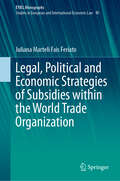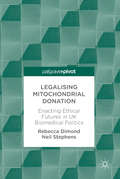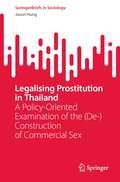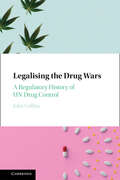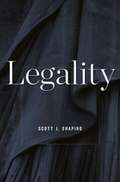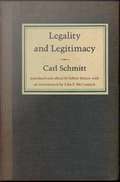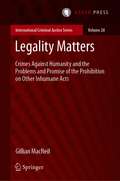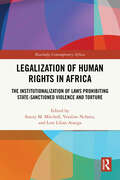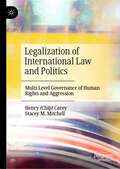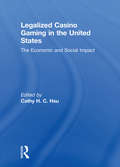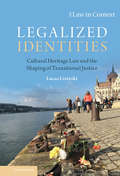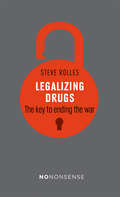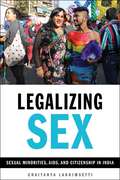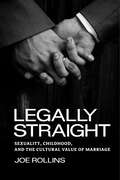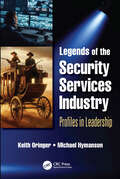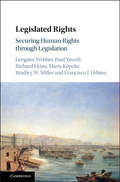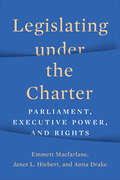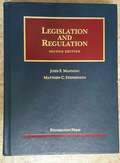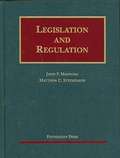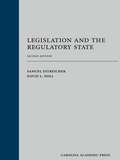- Table View
- List View
Legal, Political and Economic Strategies of Subsidies within the World Trade Organization (European Yearbook of International Economic Law #40)
by Juliana Marteli Fais FeriatoFrom the Law and Economics perspective, the book reveals the gaps of the trade multilateral system that allows governments to draw upon subsidies strategies according to their unilateral interests. The book suggests that failures in WTO mechanisms has become great challenge for the multilateral system to restrain trade diversion. Due to their character as public expenditures, since they are granted by governments through tax incentives or direct financial investment, granting subsidies are directly linked to the economic power of the countries. For this reason, some subsidies constitute a serious unfair trade practice that needs to be fought multilaterally, depending on global cooperation so that all countries can have access to international trade. Poor countries are severely affected by theses practices, meanwhile, not all developing countries are impacted the same way because there are considerable levels of development. Based on this, the book proposes a preventive mechanism to discourage subterfuge and opportunism of rich countries, in search of efficiency. In order to do so, firstly, it will be addressed the economic theories that underlie free trade, and the subsidies influence over international economy. Next, the Law and Economics approach will be presented, by which the problematic economic and political subsidy strategies of member countries will be analyzed. Based on these premises, the book shows how subsidies and countervailing measures are regulated within the WTO and it points out the failures of the WTO mechanisms to combat specific subsidies, which accentuate the differences between rich and poor countries. Finally, the book proposes preventive measures to hinder harmful effects of subsidies from materializing.
LegalTech (essentials)
by Clemens Engelhardt Benedikt QuarchDas essential vermittelt einen Überblick über den LegalTech-Markt, seine Akteure, Herausforderungen und Vorteile sowie Investionsmöglichkeiten. LegalTech ist derzeit in aller Munde und es haben sich auf dem europäischen Markt zahlreiche Unternehmen etabliert, die die Rechtsdurchsetzung digitalisieren und sowohl Verbraucher:innen als auch Anwält:innen helfen, effizienter zu arbeiten. Dabei ist LegalTech als wichtiger Teil des Fortschritts nicht mehr aus dem Rechtsmarkt wegzudenken.
Legalising Mitochondrial Donation: Enacting Ethical Futures In Uk Biomedical Politics
by Rebecca Dimond Neil StephensIn 2015 the UK became the first country in the world to legalise mitochondrial donation, a controversial germ line reproductive technology to prevent the transmission of mitochondrial disease. Dimond and Stephens track the intense period of scientific and ethical review, public consultation and parliamentary debates preceeding the decision. They draw on stakeholder accounts and public documents to explore how patients, professionals, institutions and publics mobilised within ‘for’ and ‘against’ clusters, engaging in extensive promissory, emotional, bureaucratic, ethical, embodied and clinical labour to justify competing visions of an ethical future. They describe how this decision is the latest iteration of a UK sociotechnical imaginary in which the further liberalization of human embryo research and use is rendered legitimate and ethical through modes of consultation and permissive but strictly regulated licensing. Overall, this book presents a timely, multi-dimensional, and sociological account of a globally significant landmark in the history of human genetics, and will be relevant to those with an interest in genetics, Science, Technology and Society, the sociology of medicine, reproductive technology, and public policy debate.
Legalising Prostitution in Thailand: A Policy-Oriented Examination of the (De-)Construction of Commercial Sex (SpringerBriefs in Sociology)
by Jason HungThis book problematises the socioeconomic and institutional construction of prostitution in Thai contexts, identifying the root causes that propel underprivileged, discriminated and deprived women and girls to enter the sex industry. The author considers Thailand’s tolerance of prostitution and sex trafficking, despite criminalising prostitution since 1960. In doing so, they explain how criminalising prostitution does not lower the odds of women and girls engaging in commercial sex, but rather, legally marginalises them from receiving the necessary social and healthcare support. The book highlights that neither can Thailand pragmatically practice a zero-tolerance stance against prostitution - primarily due to severe police corruption and its heavy reliance on the sex tourism economy to support the national economic growth - nor is Thailand willing to fully crack down on the domestic sex industry. Engaging in an evaluation of how legalising and decriminalising prostitution, along with continuing to implement policies and interventions that alleviate the root causes of prostitution, can help Thailand build a more inclusive society and less-prostitution-reliant economy in the long term, the book provides a nuanced understanding of the relationships between society, inequality, governance, criminality, and policy in Southeast Asian contexts. It is relevant to students and researchers in sociology, socio-criminology, public policy, government and Southeast Asian studies.
Legalising the Drug Wars: A Regulatory History of UN Drug Control
by John CollinsWhere did the regulatory underpinnings for the global drug wars come from? This book is the first fully-focused history of the 1961 UN Single Convention on Narcotic Drugs, the bedrock of the modern multilateral drug control system and the focal point of global drug regulations and prohibitions. Although far from the propagator of the drug wars, the UN enabled the creation of a uniform global legal framework to effectively legalise, or regulate, their pursuit. This book thereby answers the question of where the international legal framework for drug control came from, what state interests informed its development and how complex diplomatic negotiations resulted in the current regulatory system, binding states into an element of global policy uniformity.
Legality
by Scott J. ShapiroWhat is law? In this book, Scott Shapiro draws on current work in the theory of action to offer an original and compelling answer to this perennial philosophical question.
Legality And Legitimacy
by Carl SchmittCarl Schmitt ranks among the most original and controversial political thinkers of the twentieth century. His incisive criticisms of Enlightenment political thought and liberal political practice remain as shocking and significant today as when they first appeared in Weimar Germany. Unavailable in English until now, Legality and Legitimacy was composed in 1932, in the midst of the crisis that would lead to the collapse of the Weimar Republic and only a matter of months before Schmitt's collaboration with the Nazis. In this important work, Schmitt questions the political viability of liberal constitutionalism, parliamentary government, and the rule of law. Liberal governments, he argues, cannot respond effectively to challenges by radical groups like the Nazis or Communists. Only a presidential regime subject to few, if any, practical limitations can ensure domestic security in a highly pluralistic society. Legality and Legitimacy is sure to provide a compelling reference point in contemporary debates over the challenges facing constitutional democracies today. In addition to Jeffrey Seitzer's translation of the 1932 text itself, this volume contains his translation of Schmitt's 1958 commentary on the work, extensive explanatory notes, and an appendix including selected articles of the Weimar constitution. John P. McCormick's introduction places Legality and Legitimacy in its historical context, clarifies some of the intricacies of the argument, and ultimately contests Schmitt's claims regarding the inherent weakness of parliamentarism, constitutionalism, and the rule of law.
Legality Matters: Crimes Against Humanity and the Problems and Promise of the Prohibition on Other Inhumane Acts (International Criminal Justice Series #28)
by Gillian MacNeilThis book examines the way international criminal courts and tribunals have interpreted the crimes against humanity proscription of other inhumane acts. This clause is consistently used in spite of the long list of more specific offences forbidden as crimes against humanity. The volume proposes that the current approach is based on a misunderstanding of the nature of the clause. Properly understood, the clause is an invitation to courts to create and apply retroactive criminal laws. This leads to a problem. A prohibition on the use of retroactive criminal laws, one which admits no exceptions, is deeply embedded in international law. The author argues that it is time to revisit the assumption that retroactive criminal laws can never be deployed in a fair legal system. Drawing lessons from an exploration on the way the prohibition on retroactive laws is applied in practice, she proposes a new framework for understanding the clause proscribing the commission of other inhumane acts. This book will be of relevance to anyone interested in international criminal law or criminal law theory. Gillian MacNeil is Assistant Professor at Robson Hall, the Faculty of Law of the University of Manitoba in Winnipeg, Canada.
Legalization of Human Rights in Africa: The Institutionalization of Laws Prohibiting State-Sanctioned Violence and Torture (Routledge Contemporary Africa)
by Stacey M. Mitchell Veraline Nchotu Lem Lilian AtangaMost countries on the African continent have ratified or acceded to several human rights treaties, including the Torture Convention and the African Charter on Human and People’s Rights. This book assesses the progress African countries have made in institutionalizing human rights laws prohibiting torture, extrajudicial killings, and disappearances domestically.States ratify human rights treaties for a variety of reasons. Some commentators defend an honest sincerity of purpose, whereas others might point to material incentives. The contributors to this volume go beyond the ratification puzzle to instead reframe legalization according to Lon Fuller’s conceptualization of congruence. Congruence is an interactive variable that measures the continuous efforts of government and the public to shape the law and its implementation. By reframing legalization as an ongoing process, the model created by the authors is used to test several hypotheses about what impacts legalization in Africa more broadly, and in countries such as Mali, Cameroon, Botswana, Zimbabwe, and Tunisia, more specifically. The contributors to this volume demonstrate that the legalization of human rights is never a finished product, but is a moving target influenced by exogenous and endogenous phenomena.This volume is useful for researchers of genocide, human rights, and atrocity prevention, as well as for those interested in legalization and democratization both within Africa and other regions of the world.
Legalization of International Law and Politics: Multi-Level Governance of Human Rights and Aggression
by Stacey M. Mitchell Henry (Chip) CareyThis book provides an expanded conceptualization of legalization that focuses on implementation of obligation, precision, and delegation at the international and domestic levels of politics. By adding domestic politics and the actors to the international level of analysis, the authors add the insights of Kenneth Waltz, Graham Allison, and Louis Henkin to understand why most international law is developed and observed most of the time. However, the authors argue that law-breaking and law-distorting occurs as a part of negative legalization. Consequently, the book offers a framework for understanding how international law both produces and undermines order and justice. The authors also draw from realist, liberal, constructivist, cosmopolitan and critical theories to analyse how legalization can both build and/or undermine consensus, which results in either positive or negative legalization of international law. The authors argue that legalization is a process over time and not just a snapshot in time.
Legalized Casino Gaming in the United States: The Economic and Social Impact
by Cathy Hc HsuCovering the entire United States gaming market, Legalized Casino Gaming in the United States provides gaming researchers, policymakers, and hospitality students comprehensive overview of the history, development, legislation, and economic and social impacts of riverboat, land-based, and Native American casino gaming. Containing national and regional research about the industry, this book will provide students with a historical view on gaming and the hospitality industry, offer researchers data and current market status of the industry; and will give policymakers information about the advantages and disadvantages of a gaming industry in their community.Comprehensive and thorough, Legalized Casino Gaming in the United States is full of case studies, data, and surveys that provide you with credible information on community incomes, residents’attitudes about gaming, and gaming taxes in certain states. This fact-filled book will help you evaluate and learn about the pros and cons of the industry, including: reviewing changes in the gaming laws and regulations in particular regions and segments of the industry explaining laws and regulations by state for riverboat and other Native American land-based gaming examining negative and positive social impacts of gaming, including crime; quality of life; community services; availability of entertainment, recreation, and cultural activities; community attractiveness, such as reputation, appearance, cleanliness, and traffic; local resident attitudes; and pathological gaming explaining Nevada’s gaming regulatory system, including the roles of the Nevada Gaming Commission and Gaming Control Board, and discussing issues related to currency transactions, exclusion lists, work permits, customer disputes, and underage gambling discussing positive economic aspects of Native American gaming, such as tax benefits, in Connecticut, Wisconsin, Oregon, and Minnesota, and how the industry impacts surrounding communitiesExamining the industry from ethical, economic, and social standpoints, the contributors offer you several perspectives of a situation, not just one side of an issue, to help you make educated decisions or opinions about gaming. Bolstered with charts, graphs, tables, and future research recommendations, Legalized Casino Gaming in the United States offers you an in-depth and comprehensive look at the gaming industry, helping you weigh the positive and negative effects of one of the most popular areas of hospitality.
Legalized Identities: Cultural Heritage Law and the Shaping of Transitional Justice (Law in Context)
by Lucas LixinskiCultural heritage is a feature of transitioning societies, from museums commemorating the end of a dictatorship to adding places like the Auschwitz-Birkenau concentration camp to the World Heritage List. These processes are governed by specific laws, and yet transitional justice discourses tend to ignore law's role, assuming that memory in transition emerges organically. This book debunks this assumption, showing how cultural heritage law is integral to what memory and cultural identity is possible in transition. Lixinski attempts to reengage with the original promise of transitional justice: to pragmatically advance societies towards a future where atrocities will no longer happen. The promise in the UNESCO Constitution of lasting peace through cultural understanding is possible through focusing on the intersection of cultural heritage law and transitional justice, as Lixinski shows in this ground-breaking book.
Legalizing Drugs: The key to ending the war (No-Nonsense Guides #3)
by Steve RollesThe question is no longer if we should end the war on drugs but how we do it. This No-Nonsense Guide counts the human and financial cost of fifty years of drug war – and proceeds to outline a better way, looking at where drug law reform is already working, how to overcome the obstacles to reform, and what a post-drug war world might look like.
Legalizing Sex: Sexual Minorities, AIDS, and Citizenship in India
by Chaitanya LakkimsettiHow the rise of HIV in India resulted in government protections for gay groups, transgender people, and sex workers This original ethnographic research explores the relationship between the HIV/AIDS epidemic and the rights-based struggles of sexual minorities in contemporary India. Sex workers, gay men, and transgender people became visible in the Indian public sphere in the mid-1980s when the rise of HIV/AIDS became a frightening issue. The Indian state started to fold these groups into national HIV/AIDS policies as “high-risk” groups in an attempt to create an effective response to the epidemic. Lakkimsetti argues that over time the crisis of HIV/AIDS effectively transformed the relationship between sexual minorities and the state from one that was focused on juridical exclusion to one of inclusion. The new relationship then enabled affected groups to demand rights and citizenship from the Indian state that had been previously unimaginable. By illuminating such tactics as mobilizing against a colonial era anti-sodomy law, petitioning the courts for the recognition of gender identity, and stalling attempts to criminalize sexual labor, this book uniquely brings together the struggles of sex workers, transgender people, and gay groups previously studied separately. A closely observed look at the machinations behind recent victories for sexual minorities, this book is essential reading across several fields.
Legally Poisoned: How the Law Puts Us at Risk from Toxicants
by Carl F. CranorTake a random walk through your life and you’ll find it is awash in industrial, often toxic, chemicals. Sip water from a plastic bottle and ingest bisphenol A. Prepare dinner in a non-stick frying pan or wear a layer of Gore-Tex only to be exposed to perfluorinated compounds. Hang curtains, clip your baby into a car seat, watch television—all are manufactured with brominated flame-retardants. Cosmetic ingredients, industrial chemicals, pesticides, and other compounds enter our bodies and remain briefly or permanently. Far too many suspected toxic hazards are unleashed every day that affect the development and function of our brain, immune system, reproductive organs, or hormones. But no public health law requires product testing of most chemical compounds before they enter the market. If products are deemed dangerous, toxicants must be forcibly reduced or removed—but only after harm has been done. In this scientifically rigorous legal analysis, Carl Cranor argues that just as pharmaceuticals and pesticides cannot be sold without pre-market testing, other chemical products should be subject to the same safety measures. Cranor shows, in terrifying detail, what risks we run, and that it is entirely possible to design a less dangerous commercial world.
Legally Red: With a foreword by Sir Alex Ferguson
by Maurice WatkinsAt Old Trafford, in the corridors of power, Maurice Watkins was the guiding force. As the club solicitor, and later a director, for thirty-six years he was the man to whom Manchester United turned to negotiate the legal minefields. In his autobiography, written before his passing in 2021, the layers of secrecy are peeled back to expose the brilliance of a character who shaped the club's destiny.From the sacking of Tommy Docherty, through the late-night drive to Scotland to lure Alex Ferguson to the hot seat, to the courtroom defence of Eric Cantona for his 'kung-fu kick' on an abusive fan, Maurice Watkins was the key figure behind the scenes at United. Yet he was also front and centre for the triumphs under Ferguson and the rise of players such as David Beckham and Cristiano Ronaldo. Later, a lifelong love of sports made him a natural for leadership roles throughout the sporting world.Legally Red takes you into the boardroom of one of the greatest football clubs in the world in one of its most successful eras. But, ultimately, it's a story that goes beyond the legal battles of Manchester United. It reveals the human stories, heroics and heartaches that shaped Watkins's remarkable journey.
Legally Red: With a foreword by Sir Alex Ferguson
by Maurice WatkinsAt Old Trafford, in the corridors of power, Maurice Watkins was the guiding force. As the club solicitor, and later a director, for thirty-six years he was the man to whom Manchester United turned to negotiate the legal minefields. In his autobiography, written before his passing in 2021, the layers of secrecy are peeled back to expose the brilliance of a character who shaped the club's destiny.From the sacking of Tommy Docherty, through the late-night drive to Scotland to lure Alex Ferguson to the hot seat, to the courtroom defence of Eric Cantona for his 'kung-fu kick' on an abusive fan, Maurice Watkins was the key figure behind the scenes at United. Yet he was also front and centre for the triumphs under Ferguson and the rise of players such as David Beckham and Cristiano Ronaldo. Later, a lifelong love of sports made him a natural for leadership roles throughout the sporting world.Legally Red takes you into the boardroom of one of the greatest football clubs in the world in one of its most successful eras. But, ultimately, it's a story that goes beyond the legal battles of Manchester United. It reveals the human stories, heroics and heartaches that shaped Watkins's remarkable journey.
Legally Straight: Sexuality, Childhood, and the Cultural Value of Marriage (Critical America #63)
by Joe RollinsArgues that cultural conceptions of children – and childhood – played a key role in legalizing gay marriage Legally Straight offers a critical reading of the legal debates over lesbian and gay marriage in the United States. The book draws on key judicial opinions to trace how our understanding of heterosexuality and marriage has changed. Upon closer inspection, it seemed that the cultural value of marriage was becoming tarnished and the trouble appeared to center on one very specific issue: reproduction. As opponents of lesbian and gay marriage emphasized the link between marriage and accidental pregnancy, the evidence mounted, the arguments proliferated, and resistance began to turn against itself. Heterosexuality, it seemed for a moment, was little more than a set of palliative prescriptions for the worst of human behavior, and children became the victims. It thus became the province of the courts to reinforce the cultural value of marriage by resisting what came to be known as the “procreation argument,” the assertion that marriage exists primarily to regulate the unruly aspects of heterosexual reproduction. Cultural conceptions of children and childhood were being put at risk as gays and lesbians were denied marriage, so that writing lesbian and gay families into the marriage law became the better option.
Legendary Louisiana Outlaws: The Villains and Heroes of Folk Justice
by Keagan LejeuneFrom the infamous pirate Jean Laffite and the storied couple Bonnie and Clyde, to less familiar bandits like train-robber Eugene Bunch and suspected murderer Leather Britches Smith, Legendary Louisiana Outlaws explores Louisiana's most fascinating fugitives. In this entertaining volume, Keagan LeJeune draws from historical accounts and current folklore to examine the specific moments and legal climate that spawned these memorable characters. He shows how Laffite embodied Louisiana's shift from an entrenched French and Spanish legal system to an American one, and relates how the notorious groups like the West and Kimbrell Clan served as community leaders and law officers but covertly preyed on Louisiana's Neutral Strip residents until citizens took the law into their own hands. Likewise, the bootlegging Dunn brothers in Vinton, he explains, demonstrate folk justice's distinction between an acceptable criminal act (operating an illegal moonshine still) and an unacceptable one (cold-blooded murder). Recounting each outlaw's life, LeJeune also considers their motives for breaking the law as well as their attempts at evading capture. Running from authorities and trying to escape imprisonment or even death, these men and women often relied on the support of ordinary citizens, sympathetic in the face of oppressive and unfair laws. Through the lens of folk life, LeJeune's engaging narrative demonstrates how a justice system functions and changes and highlights Louisiana's particular challenges in adapting a system of law and order to work for everyone.
Legends of the Security Services Industry: Profiles in Leadership
by Keith Oringer Michael HymansonThe global contract security market now totals over $200 billion, with the number of private security officers exceeding that of public law enforcement officers. But this wasn’t always the case.Legends of the Security Services Industry: Profiles in Leadership presents the unique stories of 15 industry legends, who transformed the industry from early private detective and small night watch companies into large-scale contract security companies. The large-scale companies include, but are not limited to, Pinkerton, Burns International, The Wackenhut Corporation, Guardsmark, Wells Fargo, and U.S. Security Associates; as well as today’s leading security companies, Allied Universal, Securitas, G4S, Prosegur, and GardaWorld.The book begins in the nineteenth century, with early U.S. legendary detectives: Allan Pinkerton and William Burns. Then, the book focuses largely from the mid-twentieth century to the present, where successive generations of legends built large-scale contract security companies which competed with, and then acquired, those formed by the early legends. Part II legends George Wackenhut, Ira Lipman, and Tom Wathen; Part III legends, Charles Schneider, Kenneth W. Oringer, William Whitmore, Jr., and Albert Berger; and Part IV, Scandinavian legends Jørgen Philip-Sørensen, Lars Nørby Johansen, and Thomas Berglund, all developed major security companies. Part V includes current global security leaders Helena Revoredo Gut, Stephan Crétier, and Steve Jones. Part VI reviews the timelines and successful leadership of these legendary leaders, with a look at the future of the industry.The legends’ personal stories contain colorful insight into how they capitalized on the industry’s explosive growth. While each generation of legends faced unique social and competitive landscapes, their personal stories illustrate how they respectively succeeded. Their leadership and management prowess enabled them to achieve great success, as they displayed vision and achieved their goals through grit, determination, hard work, charisma, organizational skills, and calculated risk-taking.Each chapter has been extensively researched and includes firsthand accounts based on interviews with living legends, colleagues, and family of deceased legends. Personal, company and signature event photos add further color to the moving narrative. Their stories are not only highly interesting, but also provide a framework for current leaders, and the next generation of entrepreneurs, on how to build and lead large-scale security service companies. With a Foreword from Robert D. McCrie, PhD, longtime John Jay Professor and editor of the renowned industry publication The Security Letter.
Legislated Rights: Securing Human Rights through Legislation
by Grégoire Webber Bradley W. Miller Paul Yowell Richard Ekins Maris Köpcke Francisco J. UrbinaThe important aspects of human wellbeing outlined in human rights instruments and constitutional bills of rights can only be adequately secured as and when they are rendered the object of specific rights and corresponding duties. It is often assumed that the main responsibility for specifying the content of such genuine rights lies with courts. Legislated Rights: Securing Human Rights through Legislation argues against this assumption, by showing how legislatures can and should be at the centre of the practice of human rights. This jointly authored book explores how and why legislatures, being strategically placed within a system of positive law, can help realise human rights through modes of protection that courts cannot provide by way of judicial review.
Legislating under the Charter: Parliament, Executive Power, and Rights
by Emmett Macfarlane Janet Hiebert Anna DrakeLegislating under the Charter explores how governments and Parliament justify limitations on rights when advancing laws that raise rights concerns or when responding to judicial decisions under the Canadian Charter of Rights and Freedoms. Through an analysis of legislation concerning criminal justice policy, the approval of new safe consumption sites, sex work, and medical assistance in dying, the book provides a detailed analysis of the extent and nature of parliamentary deliberation about rights, the extent to which government initiatives are properly scrutinized, and the broader institutional relationships under the Charter. The authors draw from a host of qualitative data, including research interviews and examination of judicial decisions, various bills under study, Hansard debates from the floor of the House of Commons, committee and Senate scrutiny of legislation, bureaucratic advice and Charter statements by the department of justice, and news media coverage. The book offers a set of concrete reform proposals to improve the transparency and accountability of executive and bureaucratic vetting processes, and to strengthen the role of Parliament in upholding constitutional values and holding the government to account. In doing so, Legislating under the Charter contributes to the broader comparative scholarship on models of judicial review, morality policy, policy change, and constitutionalism.
Legislation And Regulation (University Casebook Ser.)
by John F. Manning Matthew C. StephensonThe updated casebook, Manning and Stephenson's Legislation and Regulation, 2d, is designed for a first-year class on Legislation & Regulation, and provides a proven, ready-to-use set of materials for those interested in introducing such a class to their 1L curriculum. The book focuses on the tools and methods of interpreting legal texts, using Supreme Court and other appellate decisions as the primary texts, yet the note material gently introduces students to applicable insights from political science, history, economics, and philosophy. The book aims to familiarize students with tools and techniques that lawyers and judges use when crafting legal arguments in statutory or regulatory contexts, and to give students a sense of the larger questions of institutional design implicated by these interpretive questions.
Legislation and Regulation
by John F. Manning Matthew C. StephensonThis casebook is specifically designed for a first-year class on Legislation Regulation, and provides a proven, ready-to-use set of materials for schools or instructors interested in introducing such a class to their 1L curriculum.
Legislation and the Regulatory State
by Samuel Estreicher David L. NollEstreicher & Noll's Legislation and the Regulatory State provides an accessible, up-to-date introduction to the institutions and procedures of the modern regulatory state. Designed to emphasize regulatory policy and the practical aspects of administrative lawyering, the casebook explores Congress's reasons for regulating and the choices it makes when enacting legislation, the legislative process and tools of statutory interpretation, administrative agencies' position within the Constitution's system of separated powers, the Administrative Procedure Act, and judicial review of agency action.
